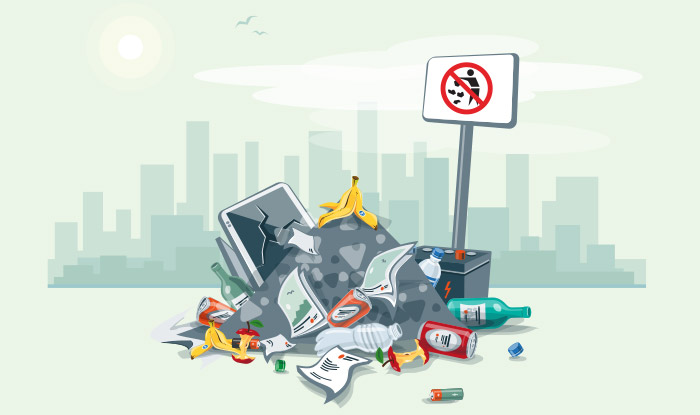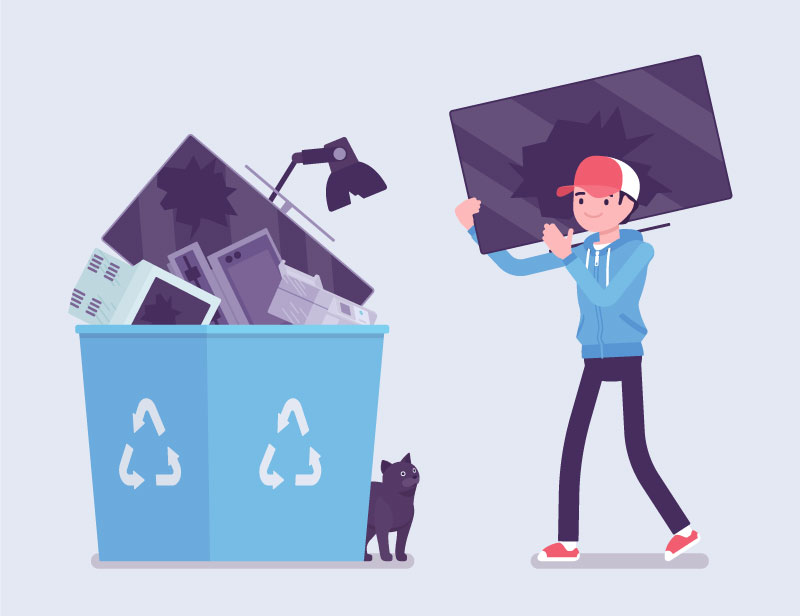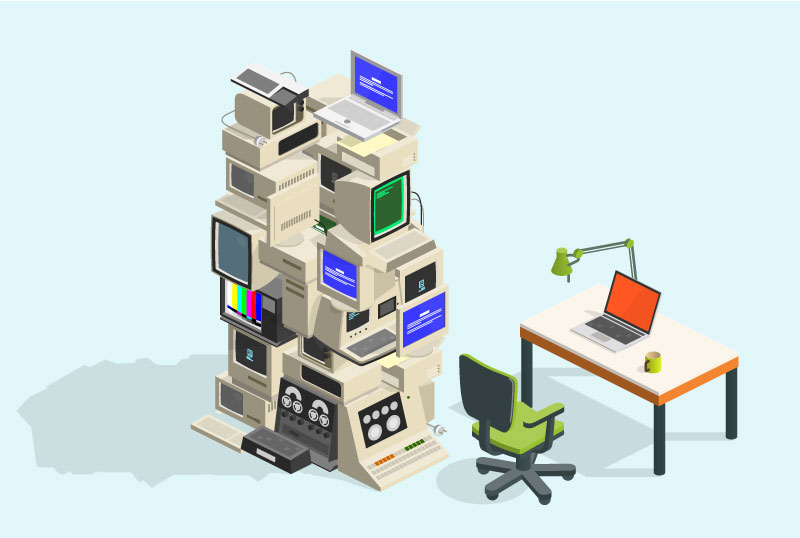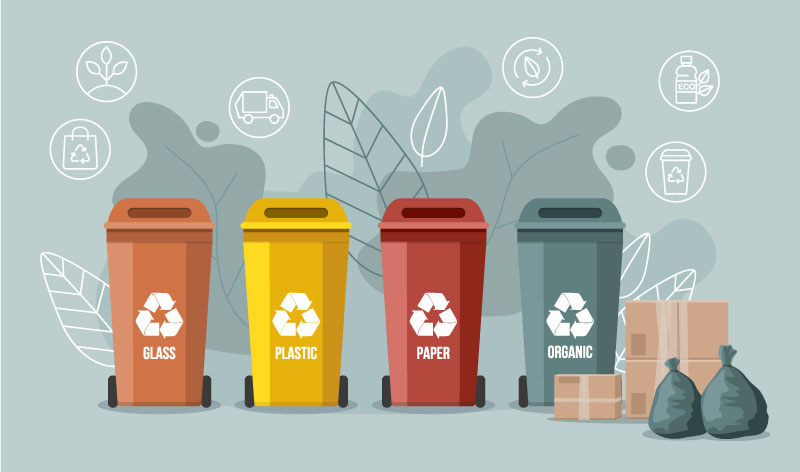E-Waste Is Toxic For Environment As Well As For Cyber Security

Photo Credit: iStock/petovarga
E-waste is a growing problem of epic proportions. In 2021, we threw an outrageous amount of 57.4 million metric tons of old electric and electronic devices into landfills. This irresponsible handling of electronic waste will result in an environment that is infected with the toxic chemicals leaching from these devices.
But this is not the only problem that arises from this nuisance. The potential of cyber security breaches through these devices is huge.
In the wrong hands, a careless drop of an old phone in the trashcan can mean identity theft, financial fraud, hacked passwords, and even homeland security breaches.
And hardly anyone touches over this issue whenever e-waste conversations come up.
Yet, it’s a ticking timebomb of potential security violations of all kinds. To protect yourself, your household, and your office from these threats, we have to take e-waste seriously. Simply deleting the files doesn’t work, and data removal from hard drives requires professional expertise.
Here’s a look at how deep this problem goes:
The Scope of the Problem
When people sell, donate, or throw away their old devices, most do not conduct a thorough cleaning of the said devices. Forbes reported in 2018 that a huge amount of used memory cards being sold on eBay still had identifiable information about their previous owners.

Image Source: iStock/Andrew_Rybalko
Most electronic devices that are sold in used-goods stores are either not password protected or have easy passwords that can be hacked. Drives and folders are not cleaned properly and data extraction becomes a piece of cake for anyone who knows what they are doing.
In 2019, researcher Josh Frantz conducted an experiment where he spent $650 on buying 85 old computers and other electronic devices. He wanted to find out how easy it was to find information on them.
To his surprise, he was able to log in to each of them. Only two out of the 85 devices had their data removed properly, while another 3 were properly encrypted.
From the rest, he was able to extract 366,300 files. This data included personal details, such as dates of births, social security numbers, passport numbers, and credit card information. He also accessed thousands of data files including images, documents, and videos.
If you take a look around the internet, you will find a shocking number of news articles where similar findings have been reported. Frantz even suggests that data extraction from these old devices is so easy and in such huge amounts that its price has gone down in bidding circles – $1 for a single SNN, and only $3 for the complete data set.
The Pandemic Made It Worse
While e-waste has always been a serious problem for decades, it has worsened during the pandemic.
Since we all started working remotely, our home computers became our work computers. We had to install and access company/client information from computers that were probably not as safe as our work computers.
Additionally, the rise in demand for these electronics fueled the second-hand market. We either replaced our old computers to get better ones with faster speeds or had to buy used ones that were already in a compromised state.
How many of us are entirely sure that the second-hand laptop we bought during the pandemic is not hacked?
Here we share 5 ways to make sure that the device you are selling/donating/discarding does not pose a cyber-security threat to you or anyone else.
1. Create a culture of sustainable electronics use
New electronic devices are sharp, snazzy, and totally fancy. We get why we all want to get our hands on the latest gadgets. Yet, the performance (and other) improvements are not worth the damage we do to our environment when we keep replacing our electronic devices every couple of years.

Image Source: iStock/anilyanik
Create a culture of sustainable use of technology in your home and business. Invest in devices that can last some years, and resist the urge to buy a new device whenever a newer model is announced.
Limit the waste as much as possible by considering donating or selling your old devices instead of throwing them away or letting them rot in a forgotten corner of the basement.
2. Ask questions when you donate or sell your used tech
When you need (or want) to replace your old device with the latest technology, consider donating it or selling it back to the manufacturer. Companies like Apple, BestBuy, Microsoft, and Dell have Takeback programs in place where you can hand over your old device to the manufacturer for credit, discounts, and other offers.
While these companies claim to recycle these old devices, consider it your responsibility to ask questions:
- Who is their recycling partner?
- How well-reputed they are in the market?
- How do they recycle the products?
- If there are parts of the devices that are going into a landfill, where is that landfill located?
This last question is crucial because the US exports so much of its waste – including e-waste – to the developing world. These third-world countries do not have the resources or legislature to beneficially and securely recycle this waste. As a result, the problem continues and grows – but now at a distance.
Soon, though, it will catch up, as we all share this beautiful planet and none of us are safe if even one of us is in danger.
To do your bit, do not think your job is done when you donate/trade in your old phone. Ask questions so you know the deal that you are getting.
3. Remove all personal data before discarding your device
Security breaches are common and costly, and you do not want your device to become a source of them. Take steps to remove all your personal data from your device before you permanently hand it over to someone else.
The U.S. Federal Trade Commission has published a useful guide to help you learn how to get rid of any residual data. The first step is to create a data backup and then properly sign out of all online accounts – social media, websites, verified emails, apps, banks, and everything else. Disconnect the device from your Wi-Fi and make sure your device is not turned on to remember any of the passwords.
You can also lookup on the internet to find software and applications that help with secure data disposal.
4. Have an E-Waste Protocol in Place
Work computers get updated and replaced more frequently than home computers. While work computers are usually more secure against cyber security threats, it is important to put responsible e-waste protocols in place so everyone knows what to do next.

Image Source: iStock/Irina Medvedeva
Start by educating your employees about how the e-waste issue is getting out of control, and an immediate response is needed. Tell them what their little efforts can do to mitigate the effects. Share statistics, information, and company policy.
Install electronics drop-off points in your office where people can come and drop off their old electronics. Partner with a local e-waste recycling firm to take care of the final step.
It would also help to sit down with your IT team and talk about where the tradeoff should be between the latest technology and sustainable tech use.
Lastly, make sure that your e-waste protocol and policy are clearly communicated to your staff. Display it in employees’ common areas as well as make it digitally accessible for quick references.
5. Hire a Professional E-Waste Recycling Service
Get in touch with a professional e-waste recycling service like Hummingbird International to really take care of the problem. A firm specialized in e-waste management will not only take care of the recycle but will handle hard drive disposal, ensuring all your personal and important data is far away from the reach of hackers
Look for a firm that is licensed and works with the guidelines and regulations of all relevant authorities. A reputable e-waste management firm should also offer you a transparent look into their processes and practices.
You want a company that is passionate about the environment, knows all about the harmful materials found in e-waste and also has methods put in place that extract the precious metals and up-cycle them into beautiful, useful objects again.
Conclusion
For decades now, e-waste has been a growing environmental concern. We keep adding millions and millions of tons of e-waste to our landfills each year, and though, it is a relatively newer source of waste, it has surpassed all other kinds of wastes by sheer quantity.
While we all have been focused on the environmental repercussions of irresponsible e-waste handling, very few of us were paying attention to how these poorly discarded devices were giving life to another serious problem: threats to cyber security.
When we implement careful, responsible, and sustainable ways to discard and recycle our electric and electronic devices, we not only send the much-needed love to Mother Earth but keep our cyberspaces safe and thriving, too.
About The Author Kelly Sampson
Kelly Sampson is a writer, blogger, and environmental enthusiast. She has strong opinions about climate change, the dogs vs. cats debate, and Oxford commas. She has lent Hummingbird International her engaging and spirited voice and turned our blog into a great place to find valuable information about e-waste, e-waste recycling, and the ITAD industry. Explore our blog to read more of her work.






